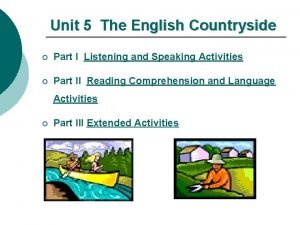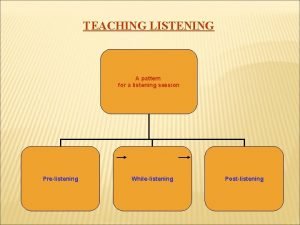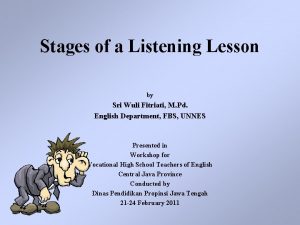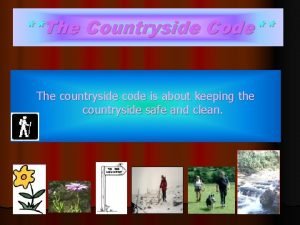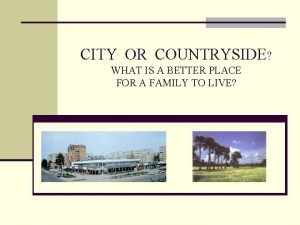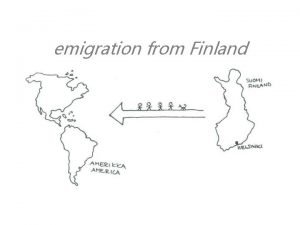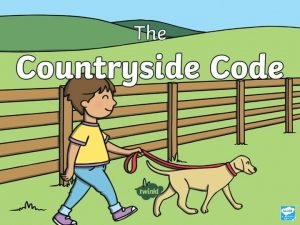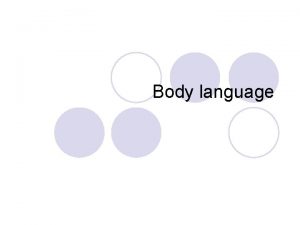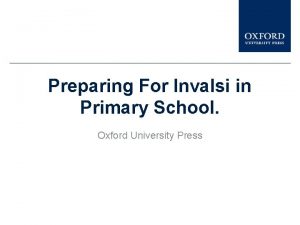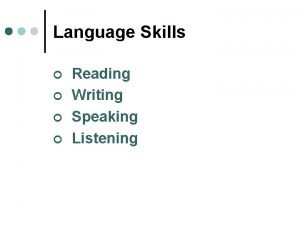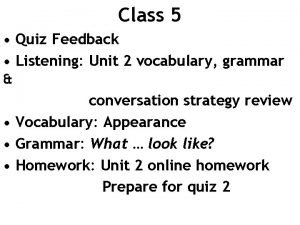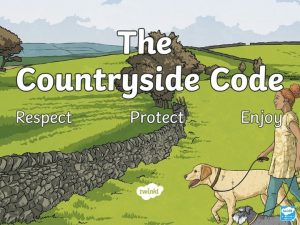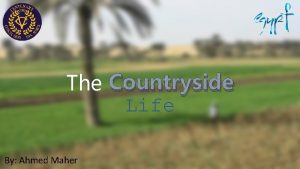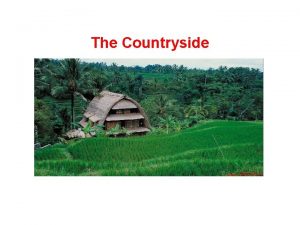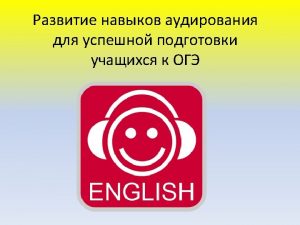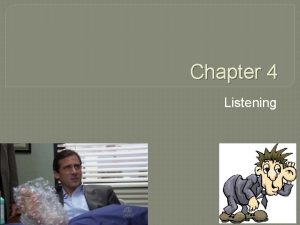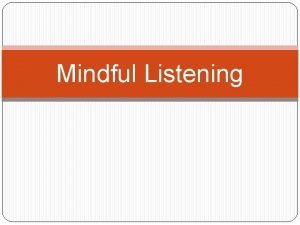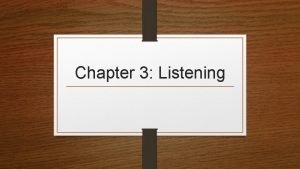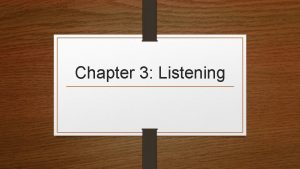Unit 5 The English Countryside Part I Listening








































- Slides: 40

Unit 5 The English Countryside ¡ Part I Listening and Speaking Activities ¡ Part II Reading Comprehension and Language Activities ¡ Part III Extended Activities

Part I Listening and Speaking Activities ¡ ¡ ¡ Introduction of functions Listen and speak Try to speak more Make your own dialogue What are they for?

Introduction of functions Ask for an opinion ¡ I’d like to have your view/opinion on ¡ Do you have any opinion/comments on… ¡ Do you have any particular views on ¡ What’s your opinion of … ¡ How do you feel/think of … ¡ Will it do if both of them have full-time jobs? ¡ I think. . . What do you feel? / What’s your view/opinion? / What do you think of it? ¡ How do you see things like …? ¡ I don’t think much of … , do you? ¡ Sb wants to. . What do you say?

Listen and speak ¡ Listen to the conversation and tick the correct answer to each question. What’s John’s preference about living in the city or the country? Key: a 2. What does John think of the large population in the city? 1. Turn Key: c to p. 1, and let’s listen. 3. What is John’s opinion of the pollution problem in the city? 1. Key: b 1. 4. What are the good points about city people, according to John? Key: a

Try to speak more Note: 1. Either say, According to someone or In someone’s opinion. Don’t say according to someone’s opinion. 2. Opinion is often used as a count noun when it means personal ideas or beliefs about a particular subject/matter/ person. 3. break one’s back (to do sth. ): work very hard (to achieve sth. )

Make your own dialogue 1. Use the following cues to make a dialogue. (Turn to page 62) 2. The following picture are two pictures of men who are bored with their present lives. They hope to have a change. Now, work with your partner to discuss some possible attractions that could be recommended to them. (Turn to page 62)

What are they for? Key: 1. d 2. b 3. g 4. f 5. c 6. e If you want to learn more Key: a. 2 b. 1 c. 7 d. 6 e. 3 f. 4 g. 5

Part II Reading Comprehension and Language Activities ¡ Pre-reading Tasks ¡ Notes ¡ Translation ¡ Comprehension work ¡ Language work (A, B, C)

Part II Reading Comprehension and Language Activities ¡ Pre-reading Tasks l Name some of the factors which could make a village a beautiful place. l What could be the typical characteristics of the English countryside? Tick the words and phrases that you think represent scenes of the English countryside. Text

The English Countryside Most Englishmen, if only because of the natural formation of their island, are essentially more at home in the lowlands than on the heights. The popular idea of an English village is of one in a valley, where it can be overlooked from the hills, clustered about its ancient church; and similarly, the general conception of a farm in this country is of a more or less commodious Turninto p. 64, and listenbytoample the text. homestead a valley, sheltered trees, with broad fields like open hands stretched out to receive the sun, and a river flowing not far away. There is always a river not far away, in England; and although, judged by Continental standards, our rivers may for the most part be small and insignificant, they are perhaps more intimately known for that.

The English Countryside Certainly they are not the kind about which national songs are composed, as in the case of the Rhine or the Danube or the Volga; but at least they are the kind in which a boy can bathe and in which (even today) a farmhand can tickle an occasional trout. They permit of such homely occupations as the gathering of watercress or the growing of osiers for basket weaving; and although the mill-wheels they once turned are silent now and weed-clogged, men still lean over the weirs on summer evenings and watch the swallows cross the clear water under the bridges. Such rivers, insignificant as they may be, influence the lives of those who live near them in the most subtle and sensuous way.

The English Countryside For some time I lived in a cottage on the western edge of the Cotswolds. In front of my garden a meadow ---itself a garden of cowslips in spring and a haunt of bee-orchises that fell with the swaths of grass in summer---dipped down to the Severn Valley. Standing at my door, I could see across the lowland orchards and pastures to the Malverns on the one hand to the Welsh mountains on the other. Those far blue ridges might be hidden by mist or cloud from time to time; but seldom was there a day when I could not clearly follow the course of the river down to its wide muddy estuary. Year in, year out, the Severn was part of my view; It was even part of my consciousness.

if only: 1) used to express a wish with reference to present or future time; 2) used to express a wish that past events had been different e. g. 1. If only I were rich. 但愿我很富有。 2. If only it would stop raining. 真希望雨能停。 3. If only I had gone by taxi. 假若我是乘计程车去的就好了。

feel/be at home in/with: to feel comfortable in a place or with a person e. g. 1. Make yourself at home! 1. 不要拘束。 2. After a while we began to feel at home with each other. 过了一会儿,我们互相之间就无拘无束了。

stretch out: to put out your hand, foot etc in order to reach something e. g. 1. The little boy stretched out his arm to take the candies on the top of the shelf. 1. 这个小男孩伸出手臂去拿放在架子最上面的糖果。 2. She stretched her neck up to find her lost sister in the crowd. 她伸长脖子去寻找她走失在人群中的妹妹。

for the most part: usually; in general; used to say that something is generally true but not completely true e. g. 1. For the most part, she is a well-behaved child. 1. 她在大多数情况下是个很乖的孩子。 2. For the most part, people seemed pretty friendly. 大多数情况下,人们似乎很友好。

permit of: (esp. in negative sentences) admit sth. as possible e. g. 1. The situation does not permit of delay. 情势刻不容缓。

haunt: n. a place that someone likes to go to often e. g. 1. The library is a favorite haunt of college students. 1. 图书馆是大学生们常去的地方。 2. a haunt of criminals 罪犯的老窝



Comprehension work (Questions for discussion ) 1. Where do the majority of Englishmen prefer to live? 2. What is the popular idea of an English village? 3. What is the general conception of an English farm? 4. Compare with rivers on the Continent, what are the English rivers like?

Comprehension work (Questions for discussion ) 5. How do these rivers influence the lives of people who live near them? 6. Where did the writer once live? 7. What could he see from his doorway? 8. Why couldn’t he see the mountains in the distance? 9. Could he always follow the course of the Severn with his eyes? 10. What effect did the Severn produce on the writer?

Language work (A, p. 66) 1. subjects, course, ample 2. stretch out, overlook, lowland 3. valley, clustered, occupations 4. homestead, sheltered 5. farm-hands, haunt 6. influenced, subtle, consciousness

Language work (B, p. 66) 1. When we lived in the country, we had a commodious house. 2. Each individual's contribution to the fund seemed insignificant, but the total sum was very large indeed. 3. Many women in the countryside still carry on such homely crafts as making jam and weaving baskets. 4. I could not fully understand the lecture because the speaker made a number of subtle distinctions.

Language work (B, p. 66) 5. A poet often has the ability to convey to his readers his own sensuous experiences. 6. When the birds were set free, they flew out of the cage and looked very much at home in the trees. 7. The rainforest in this tropical area is for the most part dark and wet. 8. The new software permits faster processing of data by the computer.

Language work (C, p. 67) 1. a. She was born in the US, but she is essentially more Chinese than American. b. Richard is essentially a soft, caring person, although he looks quite tough. c. John is essentially more a scholar than a politician.

Language work (C, p. 67) 2. a. After the accident, she became more or less handicapped, and lost her job in the factory. b. The new student seems more or less familiar with the subject, so let him join the discussion. c. The children in the mountainous village grow up more or less in freedom.

Language work (C, p. 67) 3. a. Judged by national standards, the so-called "Great Hotel” is only a small inn. b. Judged by modern moral standards, Songjiang's reconciliation with the government is sensible in some aspects. c. Judged by Chinese standards, these rivers are only small creeks.

Language work (C, p. 67) 4. a. Some new scientific advances may have unpleasant side effects, as in the case of the nuclear radioactivity. b. Some big rivers are often regarded as the origins of human civilization, as in the case of the Huanghe River and the Nile. c. Many scientific discoveries come out in dreams, as in the case of the sewing machine.

Language work (C, p. 67) 5. a. Walking down the road, we can see sharply contrasting views, tall and new buildings on the one hand, old and shabby houses on the other. b. Looking out of the window, you can see snowy mountains on the one hand an icy river on the other. c. Going through the students writing, the teacher discovered how creative the students were on the one hand, but how poor their basic writing skills were on the other.

Language work (C, p. 67) 6. a. Nobody would mind the lecture being interrupted with interesting questions from time to time. b. We would stop and ask for directions from time to time, as we were in a new city. c. The white sails of the fishing boats are obscured from time to time by mist and cloud.

Part III Extended Activities ¡ Dictation ¡ Read more ¡ Grammar work ¡ Word formation ¡ Vocabulary work ¡ Translation

Dictation ¡ Script of the Dictation There is no place like the English countryside for those who love it: its firm yet gentle lines of hills and valleys, its ordered confusion of features, its parks and lowland, its ancient castles and houses, its cottages and churches, its farms and trees, its pools and ponds and shining rivers – all present a peaceful and lovely sight. Much of the countryside is of course farmland but there are often paths through the fields, called public footpaths, which you can walk along. It is good for people to walk through such a land, forgetting for a time all the worries of the world, and become just happy wanderers in a world of pleasant breezes and song-birds and shady trees.

Read more ¡ Choose the best answer l 1. b 2. b 3. c 4. a 5. c ¡ Topic for discussion 1. What is the nature of a true village? 2. What causes the change of the nature of the village? 3. Is the change for the better or worse in your opinion?

Grammar work 1. Original: I want to buy a thriller because I love to be excited and thrilling in reading. Correct: I want to buy a thriller because I love to be excited and thrilled in reading. 2. Original: Everybody is pleased to the results. Correct: Everybody is pleased at the results. 3. Original: The old lady was really shocking at the terrible mess in the house. Correct: The old lady was really shocked at the terrible mess in the house.

Grammar work 4. Original: It is quite annoyed to interrupt one’s talk. Correct: It is quite annoying to interrupt one’s talk. 5. Original: Local people are disturbing at the news that a wild animal is still at large. Correct: Local people are disturbed at the news that a wild animal is still at large. 6. Original: Are you satisfactory with the design of the new product? Correct: Are you satisfied with the design of the new product?

Grammar work 7. Original: Shakespeare is known with his famous plays. Correct: Shakespeare is known for his famous plays. 8. Original: The speaker was bored – you could see it on the faces of the audience. Correct: The speaker was boring – you could see it on the faces of the audience. 9. Original: Researchers were disappointing at the result of the test. Correct: Researchers were disappointed at the result of the test. 9. Original: Her remarks were rather confused. Correct: Her remarks were rather confusing.

Word formation ¡ Answers: 1. fascinating 2. determined boring, amused embarrassed, telling worried 3. 4. 5.

Vocabulary work ¡ Answers for reference Towns The countryside Historic, magnificent, lively, elegant, beautiful, packed, crowded, filthy, bustling, shabby, run-down, deserted, picturesque Picturesque, hilly, pastoral, rural, beautiful, quiet, tranquil, rustic, spacious, deserted, shabby, historic, lively, magnificent

Translation 1. 2. 3. 4. 5. 6. 7. Her bedroom has large windows overlooking a beautiful lake. He collapsed into the armchair, stretching out his legs in front of him. I simply could not live there; it rained day in and day out when I went there on holiday. A dry warehouse is important especially in the case of these medicines. The people in this village, for the most part, are quiet and well behaved. We tend to get cold winters and warm, dry summers in this part of the country. It’s a simple dish to prepare, consisting mainly of beef and vegetable.
 Moving to the countryside listening
Moving to the countryside listening Pre listening while-listening and post listening examples
Pre listening while-listening and post listening examples Stages of listening lesson
Stages of listening lesson Rural tourism in lithuania
Rural tourism in lithuania Countryside code
Countryside code Countryside adjectives
Countryside adjectives Finnish countryside
Finnish countryside Respect people who live and work in the countryside
Respect people who live and work in the countryside Active vs passive listening
Active vs passive listening Differentiate inferential listening from critical listening
Differentiate inferential listening from critical listening Body language
Body language English system conversion
English system conversion Unit 10, unit 10 review tests, unit 10 general test
Unit 10, unit 10 review tests, unit 10 general test Password english test sample
Password english test sample Ready for invalsi oxford 3a soluzioni
Ready for invalsi oxford 3a soluzioni Password english test listening
Password english test listening Receptive skills
Receptive skills Bpp university stands for
Bpp university stands for Unit 2 quiz: listening comprehension
Unit 2 quiz: listening comprehension Unit 15 quiz listening comprehension
Unit 15 quiz listening comprehension Section 1 listening comprehension
Section 1 listening comprehension Unit 11 listening
Unit 11 listening Hình ảnh bộ gõ cơ thể búng tay
Hình ảnh bộ gõ cơ thể búng tay Ng-html
Ng-html Bổ thể
Bổ thể Tỉ lệ cơ thể trẻ em
Tỉ lệ cơ thể trẻ em Voi kéo gỗ như thế nào
Voi kéo gỗ như thế nào Chụp tư thế worms-breton
Chụp tư thế worms-breton Hát lên người ơi
Hát lên người ơi Môn thể thao bắt đầu bằng chữ đua
Môn thể thao bắt đầu bằng chữ đua Thế nào là hệ số cao nhất
Thế nào là hệ số cao nhất Các châu lục và đại dương trên thế giới
Các châu lục và đại dương trên thế giới Công thức tiính động năng
Công thức tiính động năng Trời xanh đây là của chúng ta thể thơ
Trời xanh đây là của chúng ta thể thơ Mật thư tọa độ 5x5
Mật thư tọa độ 5x5 Làm thế nào để 102-1=99
Làm thế nào để 102-1=99 độ dài liên kết
độ dài liên kết Các châu lục và đại dương trên thế giới
Các châu lục và đại dương trên thế giới Thể thơ truyền thống
Thể thơ truyền thống Quá trình desamine hóa có thể tạo ra
Quá trình desamine hóa có thể tạo ra Một số thể thơ truyền thống
Một số thể thơ truyền thống
